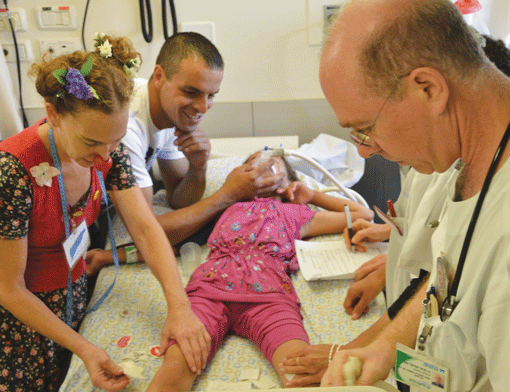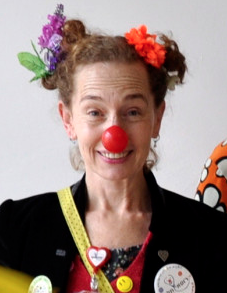Penny Hanuka will talk about how medical clowning helps calm young patients in Israeli hospitals
By MORDECAI SPECKTOR
Perhaps television producers should consider a new concept for a hospital-themed show: ER Clown.
That thought comes to mind after talking with Penny Hanuka, a medical clown in Israel and a member of the Dream Doctors Project.
As the group’s Web site explains, the clown cadre was born in 2002, at Hadassah-Hebrew University Medical Center at Ein Kerem, “out of the desire to improve the well-being of child patients and their families, and to assist the medical care staff in making procedures less anxiety-ridden.”
Hanuka recently talked by phone with the Jewish World from her home in Shilat, a moshav located midway between Tel Aviv and Jerusalem. She had just returned home from an afternoon and evening shift in the emergency room at Meir Medical Center in Kfar Saba.

Hanuka will speak on “Dream Doctors: The Story of Medical Clowning in Israel” Jan. 20 at the Sabes JCC in St. Louis Park. Her talk is part of the Culture Blvd 5 series, a program of the Minneapolis Jewish Federation’s Israel Center. The American Jewish World is a media sponsor of Culture Blvd.
Hanuka’s event is in partnership with the Twin Cities Jewish Humor Festival, which is presented by the Sabes JCC and the St. Paul JCC. Co-sponsors of Hanuka’s appearance are Women’s Philanthropy of the Minneapolis Jewish Federation, the Twin Cities Maimonides Society and the Mount Sinai Community Foundation.
Following Hanuka’s talk, Dr. Goofball (a.k.a. Gil Mann) will moderate a Q&A session.
“It started as a dream,” says Hanuka, 48, regarding the Dream Doctors, which was founded by Yaakov Shriqui, Keren Maggie and Karen Philinor. “Three clowns started in one hospital. And now… we are 103 clowns in 29 hospitals in Israel. Each hospital has a permanent team that works [regular hours]… we are scheduled in advance. And that’s amazing.”
Hanuka comes to medical clowning via street theater. She also studied with Avraham Dana, an esteemed physical theater artist in Israel. “The best in the world,” says Hanuka about Dana, who is now 80.
Hanuka and her husband, Moshe, created the Asphalt Theatre, which continues to perform street theater and travels to festivals in Israel and Europe.
Medical clowns also work in other countries; but Hanuka — who uses the clown name FiFi (Dr. Reflex) — says that in these countries, “when the doctor comes in, the clown goes out. Where there is pain, there is no clown. It’s the opposite in Israel.”

Hanuka says that Israeli doctors realized that medical clowns could be integrated into hospital procedures and help deal with the “emotional side of the situation,” while the physicians do their job.
Three years ago, Hanuka attended an international convention on pediatric rheumatology, in Orlando, Fla., along with an Israeli professor, and presented a research paper about combining medical clowns with the use of nitrous oxide, instead of traditional anesthesia. For the doctors out there in Jewish World land, the title of the paper is “Medical Clowns Facilitate Nitrous Oxide Sedation during Intra-Articular Corticosteroid Injection for Juvenile Idiopathic Arthritis.”
The 2011 Dream Doctors Project First International Conference on Medicine and Medical Clowning in Jerusalem, which attracted 250 participants from 22 countries, resolved to establish a scientific research fund to provide annual grants for research on various topics in the field of medical clowning. The Web site of the Dream Doctors in Israel includes links to 22 studies concerning medical clowns’ contributions to patient well-being and health.
In this country, the use of clowning in medical situations was popularized by the 1998 movie Patch Adams, in which the late Robin Williams played the real life Dr. Hunter Doherty “Patch” Adams. Dr. Adams, 70, continues to travel and lecture widely about his methods of bringing humor to medical patients.
“I’m going to talk about him in my lecture,” comments Hanuka, about Patch Adams. “Of course, I can’t not.”
Last year, Hanuka participated in the Performing the World conference in New York City. She talked about medical clowning in Israel, and discussed the workbook she wrote, Integrating Dream Doctors in Medical Procedures.
“I was lucky because that year Patch Adams came and he made a workshop,” she remarks. Hanuka attended Adams’ workshop and says, “He’s an amazing guy.” And she notes that Adams is not a clown, per se; rather, he’s a revolutionary in the field of medical care.
Finally, what about the fact that some children are afraid of clowns?
“That’s a very good question,” Hanuka replies. “Yes, it could be scary if a person comes to you loud,” as she makes a sort of frightening noise.
“One of our targets is to build relationships of trust with the child,” she adds, “so we are super-sensitive.”
Hanuka says that she can see by a child’s facial expression, if she or he wants her to approach. Sometimes she will keep a distance, or slowly approach a child and say, “Bye.” The child might respond, “Bye,” and that is beginning of a relationship — saying goodbye to each other, over and over again.
“We work on it a lot,” she says about medical clowning, which turns out to be serious business.
***
Penny Hanuka will talk about medical clowning in Israel 7:30 p.m. Wednesday, Jan. 20 at the Sabes JCC, 4330 S. Cedar Lake Rd., St. Louis Park. For information, go to: sabesjcc.org, or call the Israel Center at 952-417-2321.
(American Jewish World, 1.1.16)



















